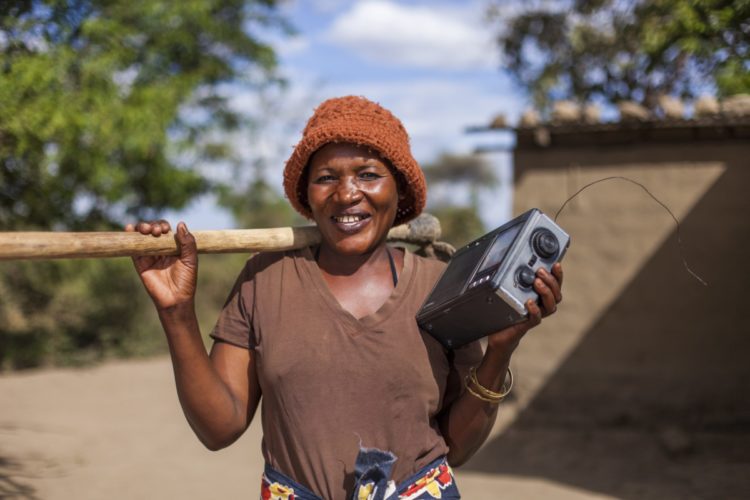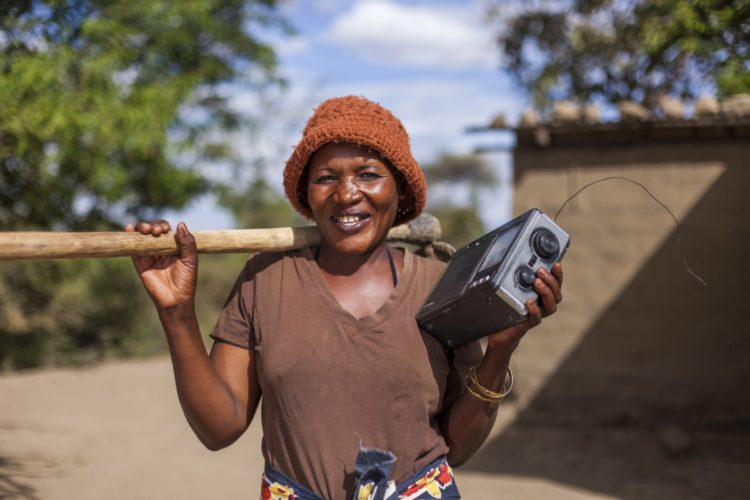CLIMATE CONVOS
The Evolution of Radio in Climate Action through the Eyes of an 80-Year-Old
Maria Demetria Kahangare was just 10 years old when radio was introduced in Uganda. At 20 years, she had her first encounter with the powerful communication tool. It was love at first sight and forever after.
Tell us about that memorable day you first met a radio.
On a random day, my elder brother returned from Kampala. Back in the 70s, coming from the big city seemed like taking a flight to Paris; one was welcomed with dancing and lots of cheerful singing. But this was no ordinary return he brought along a big radio and for us as a household, our status moved from ordinary to rich.

What was it like owning a radio then?
It was a big deal; you would have more visitors on Sunday than other families. Shockingly, today if one wanted to find out the poorest family in a village, you look for a home that has no single radio. At least every home has a small radio, and if they don’t have batteries to keep the FM tuned in, they have a “ka torch” (mobile phone) that has a radio.
Where is that radio today?
We didn’t have much to give then, and such possessions were inherited by our grandchildren as valuables or treasures to add prestige to their own homes.
What information did you receive from the radios? We mostly received news about current affairs, the weather, and death announcements.
What did they say about the weather?
They would tell us that certain areas would receive rain and other places would have sun. Growing up in Kabale, it was mostly cool and rainy, so when we heard over the radio that places like Kampala and Masaka were experiencing more sunny days, we regretted it on their behalf because it meant they had less to eat since they weren’t able to farm during the dry seasons.
The information you received over the radio about weather, did you follow it?
Honestly, no. We would follow our traditional norms; one would stand on the hilltop and look across to Rwanda. If it seemed misty, you prepared for rain. But then the science people on the radio always challenged us. When they predicted that it would rain, it actually rained, and this always mesmerized us. We wondered how they could tell, yet they didn’t live in our villages. We always called them “aba science” meaning scientists.
Do you know about climate change?
Yes, our world was different from what you young people are experiencing. The earth looked different then; the sun would never destroy or rain cause floods. It was always in moderation and enough. Now I feel like I am in a different world; everything has changed. The weather people on the radio now deliver more than rain alerts, it’s children and women dying in floods, mudslides and disaster stories etc.
Where do you think it all started?
It all started when they cleared the swamps. We noticed that the daily mist and fog started disappearing gradually. In 2016, the government encouraged people to plant trees, and somehow the misty mornings returned but not like the ones we had when we had more swamps. In the old days, the fog cleared around noon, but now by 9:00 AM, the sun is out and hot.
Who is to blame?
“Abantu,” it’s the people. We have destroyed the swamps that make up the natural water system; we have broken down the hills to build admirable houses; we have damaged the earth. We are the cause of it all. Do you know what’s unfortunate? People have gone back to cut down the trees to use them for charcoal because they have nothing to eat, and when they do that, the earth becomes even worse.
Given a chance, how would you solve the problem of climate change?
Firstly, I would fight to end poverty, but we can’t ignore the fact that the younger generation today is able to find creative ways to overcome such problems at the same time.
If you wanted to teach people about clean cooking options instead of charcoal, how best would this message reach everyone in Uganda?
I have not travelled to the northern part of Uganda, but I can assure you every Ugandan household has a radio, and it’s active, especially in the morning and evening. Those who have made some money can access television too.
Overall, what relationship does your community have with radios today?
In my community, radio is a farmer’s best companion. Actually, now people carry small phones with inbuilt radios, unlike us who carried the old-fashioned cassette to the garden.
What worries you most about this whole situation?
I worry about our young women and men who have to carry loads of timber up the hill to stalk the beans. We never used to grow climbing beans, but now our soils reject the common short beans. The new species introduced to our soils require double effort and input and so will the more climate changes.
What are your partying shots?
I would like to encourage the young women and men to strive for a better world, it’s your time and nothing should limit you from enjoying a greener and more peaceful environment.
